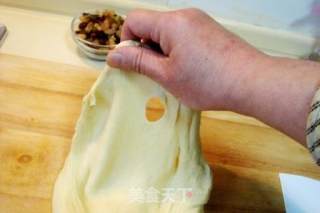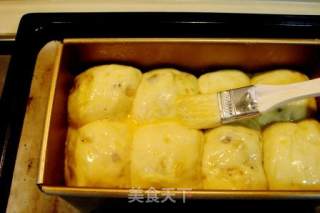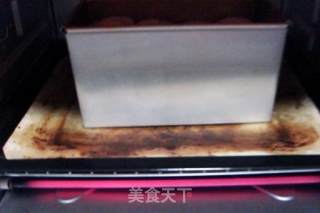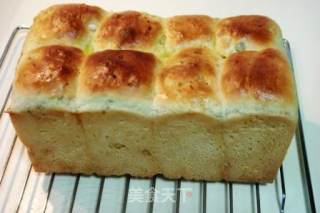Creamy Honey Bean Toast
1.
All ingredients.
2.
Make the soup first and put flour in the milk. A ratio of five to one is more appropriate.
3.
Then use a bamboo board to mix the two thoroughly and there are no lumps.
4.
Put the pot on the heat and boil it over a medium-to-small fire. During the period, use the bamboo board to stir the pot continuously. Do not paste the pot until it is sticky and then remove from the fire.
5.
After leaving the fire, continue to stir evenly and pour it into a container to cool down, cover it with plastic wrap and put it in the refrigerator for one hour before use.
6.
Before mixing, mix all the dry powders, such as flour, dry yeast, sugar, and salt, and mix them thoroughly.
7.
Then add the eggs and the chilled soup, and then mix with water to form a dough.
8.
After the dough is initially synthesized, take it out of the basin and place it on the chopping board and knead repeatedly until the hand feels firm and the surface is not too sticky.
9.
Then add the finely chopped solid cream, wrap in the dough and knead repeatedly. At this time, the dough will be very sticky. You can use a rubber scraper to scrape the wet surface on the chopping board and your hands back and forth.
10.
Until the oil and noodles are fully fused, you feel that the stickiness of the noodles is decreasing, but there is a slight stickiness, which proves that the gluten has been released. It will be very comfortable to clean the panel and the broken noodles on your hands. Your kneading skills have arrived.
11.
Next, you can check the results of kneading. Pull the dough with one hand, it will fall and the film will appear without breaking the tendons. A round hole with no burrs around it appears when you poke it with your fingers, which is similar to a chewing gum bubble film. Very successful. Congratulations on completing the most important step of handmade.


12.
Simply knead the dough you have successfully kneaded on the chopping board to form a dough. You don’t need to knead it to find the feeling anymore. After you knead the dough successfully, you can overdo it again. Kneading will cause the noodles to break tendons, and that will be a waste of all previous efforts, and we will talk about this problem in the future. The above is the basic method of kneading the noodles by the post-oil method. It takes about 20-30 minutes. Gentlemen with more power may be faster. I would like to remind everyone that don't be afraid when the noodles are too viscous. It is an important process from sticking to full absorption. If this link is not passed, high-quality bread cannot be made.
13.
Put the dough in the basin.
14.
Next, start the basic fermentation of the dough, cover the basin with plastic wrap, and swell in an environment with a temperature of 28-32 degrees and a humidity of 80-85 degrees. If the temperature is not enough, you can use the steamer to ferment, generally the water is heated. You can test the temperature by hand. At this time, the water temperature is about 50 degrees, and the temperature of the cage layer is just about 35 degrees. It is best to have a needle thermometer at home. If you don’t have it, just follow the method I said. I have done experiments on this method with a needle gauge, so it works very well.
15.
Put the basin covered with plastic wrap into the basket.
16.
Cover the lid, and then wait for the noodle baby to grow up.
17.
It can be taken out when the hair rises to 2.5 times to 3 times. It takes about 40 minutes to 1 hour for this process to keep warm.
18.
After the basic dough is fermented, take it out. Dip dry flour with your fingers and poke the dough without rebounding.
19.
Put the dough on the chopping board and press with both hands to evacuate the gas inside the dough.
20.
Press the dough again, and press the dough into an oval shape by the way when the air is exhausted, and spread the colored honey beans evenly on one-half of the dough.
21.
Then fold the other half of the dough.
22.
Use your hands to fold the noodles with honey beans repeatedly until the honey beans are evenly distributed on all parts of the stool.
23.
Then use a rubber spatula to divide the big dough into small pieces you need. This time I made big toast, so divide it into eight even pieces according to the size of the mold, and then knead them into round balls.
24.
Cover the small dough with plastic wrap and start the intermediate fermentation, which takes about 30 minutes, and the fermentation is done on the cutting board without additional heat preservation.
25.
After 30 minutes of fermentation in the middle, round the dough again and arrange them neatly in the mold.
26.
Cover the mold with plastic wrap and start the final fermentation. The temperature is controlled at 28-32 degrees, and the humidity is kept at about 80.
27.
We still put it in a steamer for heat preservation and fermentation. Another way is to put the mold in an oven preheated at 30 degrees, and place an iron pan with warm water under the mold for heat preservation, moisturizing and fermentation. , Both methods can be used.
28.
Make the final fermentation, make the dough rise to twice the size of the original dough, and then proceed to the last process and put it in the oven for baking.
29.
Spread the egg liquid before baking. It is best to add half of the water when preparing the egg liquid. Don't rush to color the big bread too quickly, so add some water and apply a thin layer on the dough.


30.
The oven should be preheated before baking. Since the household oven is small in size, it is generally sufficient to preheat for 5 minutes. This bread is larger, so the temperature should not be too high. The reason is that the outside is burnt and the inside has not been baked. It became raw bread! It doesn’t matter if it fails, it’s mainly because it causes unnecessary waste. We usually control the temperature between 160 and 170 degrees. For example, home ovens with temperature control devices are the easiest to bake this kind of bread. You can adjust the temperature to the upper and lower fire position of 160 degrees and bake it for a while. I use this method often. I can do some other things when I set the time. Today I will use this temperature to bake, and the bake time is set at 35 minutes.


31.
After 35 minutes of baking, the bread is out of the oven. The mold must be heated and the bread is dried on the drying rack. If there is no drying rack, the original oven rack can be used, and the bottom will be slightly overhead. The bottom of my grill has four small claws 1 cm high, so you can put it directly on it to cool.


32.
For the storage of bread, the bread should be stored when the temperature is lowered to 35 degrees, that is to say, put it in a big fresh-keeping bag and store it after a little residual temperature. Generally, the fresh-keeping period is about 4 to 5 days. Don’t put it in the refrigerator. It can only be stored at room temperature. The reason is that the protein and oil in the bread will solidify at a low temperature, and the aroma of the yeast will be lost after the yeast fermentation. Therefore, the bread will change its taste. That’s why the preserved bread taken out of the refrigerator doesn't taste good anymore, and the taste will become harder. Bread tastes best when it is left to cool for two hours. It must not be eaten while it is hot. It should be eaten only after the carbon dioxide gas that expands and remains inside is discharged when it is baked. This is the healthiest way to eat it.
33.
Loose bread tissue that broke apart after 30 minutes of drying.